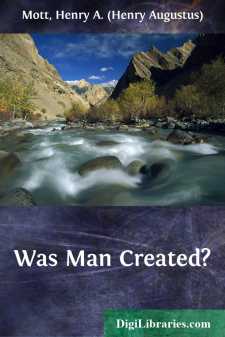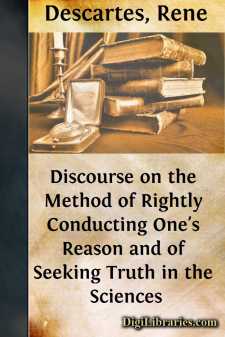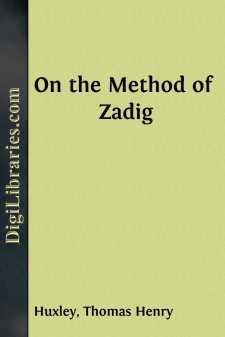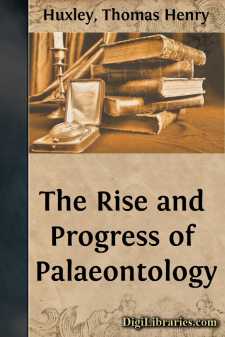Science
- Astronomy 18
- Biology 40
- Chemistry 13
- Electricity 1
- General 38
- History 6
- Light 1
- Paleontology 2
- Philosophy & Social Aspects 1
- Physics 3
- Relativity 2
- Study & Teaching 1
- Waves & Wave Mechanics 1
Science Books
Sort by:
PREFACE. This work was originally written to be delivered as a lecture; but as its pages continued to multiply, it was suggested to the author by numerous friends that it ought to be published in book-form; this, at last, the author concluded to do. This work, therefore, does not claim to be an exhaustive discussion of the various departments of which it treats; but rather it has been the aim of the...
more...
by:
Rene Descartes
PART I Good sense is, of all things among men, the most equally distributed; for every one thinks himself so abundantly provided with it, that those even who are the most difficult to satisfy in everything else, do not usually desire a larger measure of this quality than they already possess. And in this it is not likely that all are mistaken the conviction is rather to be held as testifying that the...
more...
by:
William Crookes
THE CHEMICAL HISTORY OF A CANDLE LECTURE I. A CANDLE: THE FLAME—ITS SOURCES—STRUCTURE—MOBILITY—BRIGHTNESS. I purpose, in return for the honour you do us by coming to see what are our proceedings here, to bring before you, in the course of these lectures, the Chemical History of a Candle. I have taken this subject on a former occasion; and were it left to my own will, I should prefer to repeat...
more...
INTRODUCTION The Great War has caused a vast destruction of the sounder portion of the belligerent peoples and it is certain that in the next generation the progeny of their weaker members will constitute a much larger proportion of the whole than would have been the case if the War had not occurred. Owing to this immeasurable calamity that has befallen the white race, the question of eugenics has...
more...
by:
Richard C. Fox
In the course of examining material from fissure deposits of early Permian age collected from a limestone quarry near Fort Sill, Oklahoma, the author recovered several tooth-bearing fragments of small pelycosaurs. The fragments were examined, compared with descriptions of known kinds appearing in the literature, and determined to be new genera within the Nitosauridae (Edaphosauria) and Sphenacodontidae...
more...
It is an usual and a commendable practice to preface the discussion of the views of a philosophic thinker by some account of the man and of the circumstances which shaped his life and coloured his way of looking at things; but, though Zadig is cited in one of the most important chapters of Cuvier's greatest work, little is known about him, and that little might perhaps be better authenticated than...
more...
Our fabulist warns "those who in quarrels interpose" of the fate which is probably in store for them; and, in venturing to place myself between so powerful a controversialist as Mr. Gladstone and the eminent divine whom he assaults with such vigour in the last number of this Review, I am fully aware that I run great danger of verifying Gay's prediction. Moreover, it is quite possible that...
more...
by:
Edward Everett
TWO NEW INSTITUTIONS OF SCIENCE; THE SCENES WHICH ATTENDED THEIR CHRISTENING. In the month of August last, two events took place in the city of Albany, which have more than an ephemeral interest. They occurred in close connection with the proceedings of a Scientific Convention, and the memory of them deserves to be cherished as a recollection of the easy way in which Science may be popularized and be...
more...
That application of the sciences of biology and geology, which is commonly known as palaeontology, took its origin in the mind of the first person who, finding something like a shell, or a bone, naturally imbedded in gravel or rock, indulged in speculations upon the nature of this thing which he had dug out—this "fossil"—and upon the causes which had brought it into such a position. In this...
more...
by:
Various
THE CAT. PART 1.walk´-ingthoughtknewsheathswatchedstrokedsmoothwon´-dergroundfore´-pawsyawnmis-take´shak´-ingtoesstretchedclaw1. Pussy came walking along the garden-path. Harry watched her, and saw that she did not like the damp ground. 2. She jumped over the pools, and then began to run, shaking her paws as she got to the house. 3. 'Now, a dog does not mind wet feet,' Harry thought;...
more...











